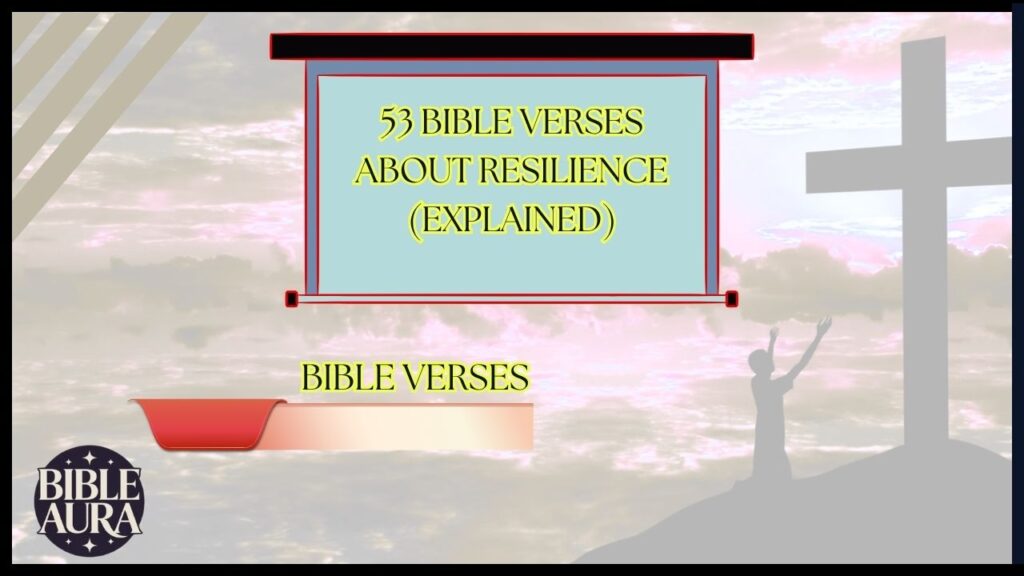Bible Verses About Resilience: Life has a way of challenging us all. Whether facing personal hardships, professional setbacks, or spiritual struggles, the Bible offers profound wisdom on persevering through difficult times. Scripture doesn’t promise an absence of trials but instead provides guidance on developing the spiritual fortitude to withstand them.
Resilience the ability to recover from difficulties is a theme woven throughout God’s Word. From the perseverance of Job to the endurance of Paul, biblical figures demonstrate how faith can sustain us when everything else seems uncertain.
In these 53 verses, we find divine encouragement for rebuilding after devastation, standing firm against opposition, and maintaining hope when circumstances suggest despair. They remind us that resilience isn’t merely human determination but a spiritual discipline strengthened through our relationship with God.
Also Read: 40 Bible Verses About Clarity (Explained)
Resilience Through Faith in God’s Promises
1. Isaiah 40:31
“But those who hope in the LORD will renew their strength. They will soar on wings like eagles; they will run and not grow weary, they will walk and not be faint.”
This verse promises supernatural renewal for those who place their trust in God. When we feel depleted, waiting expectantly on the Lord provides a spiritual second wind that transcends our natural abilities. Practice patient hope in God’s timing, especially when your strength feels most diminished.
2. Romans 5:3-5
“Not only so, but we also glory in our sufferings, because we know that suffering produces perseverance; perseverance, character; and character, hope. And hope does not put us to shame, because God’s love has been poured out into our hearts through the Holy Spirit, who has been given to us.”

Paul reveals the transformative process that occurs through difficulties. Hardships aren’t meaningless but serve as spiritual development tools that ultimately strengthen our connection to God. View your current challenges as character-building opportunities rather than pointless suffering.
3. James 1:12
“Blessed is the one who perseveres under trial because, having stood the test, that person will receive the crown of life that the Lord has promised to those who love him.”
James connects endurance through trials with eternal rewards. Our resilience demonstrates authentic love for God and results in spiritual blessing. Remember that your faithful endurance is noticed by God and will be rewarded beyond what you can imagine.
4. Philippians 4:13
“I can do all this through him who gives me strength.”
Paul’s famous declaration isn’t about achieving personal ambitions but enduring circumstances both pleasant and difficult through Christ’s empowerment. When facing seemingly impossible situations, consciously rely on Christ’s strength rather than your own limited resources.
5. Psalm 46:1-3
“God is our refuge and strength, an ever-present help in trouble. Therefore we will not fear, though the earth give way and the mountains fall into the heart of the sea, though its waters roar and foam and the mountains quake with their surging.”
The psalmist describes God as a reliable sanctuary when everything else collapses. No matter how catastrophic our circumstances, God remains stable and accessible. Make God your first resource in crisis, not your last resort after all else fails.
6. 2 Corinthians 4:8-9
“We are hard pressed on every side, but not crushed; perplexed, but not in despair; persecuted, but not abandoned; struck down, but not destroyed.”
Paul acknowledges the reality of severe pressure while emphasizing our capacity to withstand it through God’s presence. Resilience doesn’t mean avoiding difficulty but experiencing God’s sustaining grace within it. Accept that pressure is inevitable but remember that God ensures it won’t completely overwhelm you.
7. Joshua 1:9
“Have I not commanded you? Be strong and courageous. Do not be afraid; do not be discouraged, for the LORD your God will be with you wherever you go.”
God’s command to Joshua reveals that courage is a choice we make based on God’s promised presence. Strength comes not from personal confidence but from the assurance that God accompanies us. Start each challenging day by consciously acknowledging God’s presence with you.
8. Psalm 27:14
“Wait for the LORD; be strong and take heart and wait for the LORD.”
David connects patience with resilience, suggesting that sometimes the most courageous action is waiting for God’s timing. Faithful waiting isn’t passive but requires active trust. Practice patient endurance by resisting the urge to force solutions before God’s proper timing.
9. Hebrews 10:36
“You need to persevere so that when you have done the will of God, you will receive what he has promised.”
The writer reminds believers that endurance is necessary to experience the fulfillment of God’s promises. Resilience isn’t optional but essential for spiritual maturity. Keep eternal perspective by remembering that your current endurance connects to future blessing.
10. Galatians 6:9
“Let us not become weary in doing good, for at the proper time we will reap a harvest if we do not give up.”
Paul encourages persistence in righteous living despite lack of immediate results. Spiritual and ethical consistency eventually produces meaningful outcomes. Continue in faithful obedience even when positive results aren’t immediately visible.
Also Read: 38 Bible Verses About Anointing (Explained)
Resilience Through Life’s Difficulties
11. James 1:2-4
“Consider it pure joy, my brothers and sisters, whenever you face trials of many kinds, because you know that the testing of your faith produces perseverance. Let perseverance finish its work so that you may be mature and complete, not lacking anything.”

James challenges us to reframe our perspective on trials, seeing them as opportunities for spiritual development. The testing process, while uncomfortable, produces spiritual completeness. Choose to view your current challenges as divine invitations to deeper maturity rather than random misfortunes.
12. Romans 8:28
“And we know that in all things God works for the good of those who love him, who have been called according to his purpose.”
Paul affirms God’s ability to incorporate every circumstance even painful ones into His redemptive purposes for believers. This promise doesn’t guarantee immediate comfort but ultimate transformation. Trust that God is working behind the scenes to redeem even your most difficult experiences.
13. Psalm 34:19
“The righteous person may have many troubles, but the LORD delivers him from them all.”
David acknowledges that righteousness doesn’t prevent troubles but guarantees God’s deliverance through them. Following God doesn’t exempt us from difficulty but ensures divine assistance within it. Remember that God’s deliverance often comes through the trial, not always by removing it.
14. 2 Corinthians 12:9-10
“But he said to me, ‘My grace is sufficient for you, for my power is made perfect in weakness.’ Therefore I will boast all the more gladly about my weaknesses, so that Christ’s power may rest on me. That is why, for Christ’s sake, I delight in weaknesses, in insults, in hardships, in persecutions, in difficulties. For when I am weak, then I am strong.”
Paul reveals the paradox that acknowledging our limitations opens us to experiencing God’s unlimited power. Our weakness becomes the channel through which divine strength flows. Instead of hiding your vulnerabilities, acknowledge them to God as opportunities for experiencing His perfect strength.
15. Nahum 1:7
“The LORD is good, a refuge in times of trouble. He cares for those who trust in him.”
The prophet describes God as both a protective shelter and an attentive caregiver during difficult seasons. God’s goodness is especially accessible when circumstances are most challenging. Run to God’s presence first when troubles arise rather than viewing Him as a last resort.
16. Psalm 91:1-2
“Whoever dwells in the shelter of the Most High will rest in the shadow of the Almighty. I will say of the LORD, ‘He is my refuge and my fortress, my God, in whom I trust.'”
The psalmist uses military imagery to describe God’s protective presence for those who consistently abide with Him. Security comes through intimate relationship, not occasional connection. Develop daily habits that keep you consciously dwelling in God’s presence.
17. 1 Peter 5:10
“And the God of all grace, who called you to his eternal glory in Christ, after you have suffered a little while, will himself restore you and make you strong, firm and steadfast.”
Peter promises that suffering is temporary while God’s restorative work is comprehensive. God personally participates in rebuilding us after difficult seasons. Remember that your current suffering has both a limit and a purpose in God’s redemptive plan.
18. Psalm 30:5
“For his anger lasts only a moment, but his favor lasts a lifetime; weeping may stay for the night, but rejoicing comes in the morning.”
David contrasts the temporary nature of distress with the enduring quality of God’s blessing. Emotional darkness eventually gives way to spiritual light. When experiencing prolonged difficulty, remind yourself of the promised dawn that follows even the darkest night.
19. Lamentations 3:22-23
“Because of the LORD’s great love we are not consumed, for his compassions never fail. They are new every morning; great is your faithfulness.”

Even in the midst of national catastrophe, Jeremiah recognized God’s faithful compassion as a daily renewable resource. God’s mercy prevents our complete destruction during overwhelming circumstances. Begin each day by consciously receiving God’s fresh compassion rather than carrying yesterday’s burdens.
20. Matthew 11:28-30
“Come to me, all you who are weary and burdened, and I will give you rest. Take my yoke upon you and learn from me, for I am gentle and humble in heart, and you will find rest for your souls. For my yoke is easy and my burden is light.”
Jesus invites the exhausted to exchange their crushing loads for His manageable one. Resilience comes through connection with Christ, not through independent striving. Release your independent struggle and accept Jesus’ partnership in carrying your burdens.
Also Read: 35 Bible Verses About Commitment
Resilience Through Scripture and Prayer
21. Psalm 119:50
“My comfort in my suffering is this: Your promise preserves my life.”
The psalmist found life-sustaining power in God’s word during painful circumstances. Scripture provides both comfort and preservation when everything else seems unstable. Identify specific promises from God’s Word that directly address your current struggles.
22. Psalm 119:114
“You are my refuge and my shield; I have put my hope in your word.”
The psalmist expresses complete dependence on God’s word for both protection and future confidence. Scripture serves as both immediate shelter and foundation for lasting hope. Memorize key verses that speak to your specific vulnerabilities and recite them when facing challenges.
23. Philippians 4:6-7
“Do not be anxious about anything, but in every situation, by prayer and petition, with thanksgiving, present your requests to God. And the peace of God, which transcends all understanding, will guard your hearts and your minds in Christ Jesus.”
Paul provides a practical strategy for replacing anxiety with supernatural peace through thankful prayer. Resilience comes through maintaining continuous communication with God. Practice turning anxious thoughts into specific prayers offered with gratitude.
24. Psalm 55:22
“Cast your cares on the LORD and he will sustain you; he will never let the righteous be shaken.”
David invites believers to deliberately transfer their worries to God, who promises both support and stability. Resilience comes through releasing our burdens rather than carrying them. Physically write down your concerns and symbolically give them to God in prayer.
25. 1 Thessalonians 5:16-18
“Rejoice always, pray continually, give thanks in all circumstances; for this is God’s will for you in Christ Jesus.”
Paul provides three spiritual practices that develop resilience: consistent joy, unbroken prayer, and deliberate gratitude regardless of circumstances. These habits align us with God’s purposes and strengthen our spiritual core. Begin practicing these three disciplines daily, especially when you don’t feel like it.
26. Isaiah 26:3
“You will keep in perfect peace those whose minds are steadfast, because they trust in you.”
Isaiah reveals the connection between mental focus, trust, and experiencing God’s complete peace. Internal calm comes through deliberate attention to God rather than circumstances. Redirect your thoughts toward God’s character whenever your mind fixates on troubling situations.
27. Hebrews 4:16
“Let us then approach God’s throne of grace with confidence, so that we may receive mercy and find grace to help us in our time of need.”
The writer encourages bold access to God’s presence when we most need divine assistance. God makes supernatural resources available precisely when our needs are greatest. Approach prayer not as a last resort but as your privileged access to unlimited divine resources.
28. Romans 12:12
“Be joyful in hope, patient in affliction, faithful in prayer.”
Paul provides three spiritual responses to different life circumstances: joy in future promise, endurance in present difficulty, and consistency in divine communication. Resilience develops through appropriate responses to each life season. Evaluate which of these three qualities you most need to develop in your current circumstances.
29. Psalm 18:2
“The LORD is my rock, my fortress and my deliverer; my God is my rock, in whom I take refuge, my shield and the horn of my salvation, my stronghold.”

David uses multiple images of strength and protection to describe God’s presence in his life. God provides comprehensive security addressing every dimension of vulnerability. Identify which aspect of God’s protection you most need today and consciously rely on it.
30. Proverbs 18:10
“The name of the LORD is a fortified tower; the righteous run to it and are safe.”
Solomon portrays God’s character (represented by His name) as an impenetrable stronghold available through immediate prayer. Safety comes through prompt spiritual retreat rather than self-protection. Practice running to prayer as your first response when threats arise.
Also Read: 51 Bible Verses About Butterflies
Resilience Through Community and Service
31. Ecclesiastes 4:9-10
“Two are better than one, because they have a good return for their labor: If either of them falls down, one can help the other up. But pity anyone who falls and has no one to help them up.”
Solomon highlights the practical advantage of supportive relationships during difficult times. Resilience develops within community rather than in isolation. Intentionally build relationships that provide mutual support during challenging seasons.
32. Hebrews 10:24-25
“And let us consider how we may spur one another on toward love and good deeds, not giving up meeting together, as some are in the habit of doing, but encouraging one another and all the more as you see the Day approaching.”
The writer emphasizes the necessity of consistent community for maintaining spiritual resilience. Regular encouragement from others helps sustain our endurance. Commit to regular fellowship even when logistical challenges or emotional resistance make isolation tempting.
33. Galatians 6:2
“Carry each other’s burdens, and in this way you will fulfill the law of Christ.”
Paul instructs believers to participate in each other’s struggles as an expression of Christ’s love. Sharing difficulties reduces their weight and demonstrates practical love. Look for opportunities to lighten someone else’s load, even while carrying your own.
34. Proverbs 27:17
“As iron sharpens iron, so one person sharpens another.”
Solomon uses metallurgy to illustrate how challenging relationships develop our character. Spiritual growth often occurs through friction rather than comfort. Appreciate the people who challenge you rather than just those who comfort you.
35. 1 Corinthians 12:26
“If one part suffers, every part suffers with it; if one part is honored, every part rejoices with it.”
Paul describes the church as an interconnected body where individual experiences affect the whole community. Resilience is a shared reality rather than merely personal. Practice genuine empathy by allowing yourself to be affected by others’ struggles rather than maintaining emotional distance.
36. Acts 14:22
“…strengthening the disciples and encouraging them to remain true to the faith. ‘We must go through many hardships to enter the kingdom of God,’ they said.”

Paul and Barnabas prepared new believers for inevitable difficulties rather than promising prosperity. Realistic expectations about hardship build spiritual endurance. Help younger believers develop biblical expectations about suffering rather than sheltering them from difficult truths.
37. 2 Timothy 2:3
“Join with me in suffering, like a good soldier of Christ Jesus.”
Paul invites Timothy to view hardship as part of his spiritual calling rather than an anomaly. Endurance becomes possible when difficulty is anticipated rather than unexpected. Approach your Christian life with the mindset of a soldier prepared for challenge rather than a tourist expecting comfort.
38. Ephesians 6:18
“And pray in the Spirit on all occasions with all kinds of prayers and requests. With this in mind, be alert and always keep on praying for all the Lord’s people.”
Paul connects resilience with persistent intercession for the broader community of faith. Prayer for others strengthens our own spiritual endurance. Develop a regular practice of praying for others facing challenges, not just for your own needs.
39. John 16:33
“I have told you these things, so that in me you may have peace. In this world you will have trouble. But take heart! I have overcome the world.”
Jesus honestly acknowledges worldly troubles while offering himself as the source of peace within them. Christ’s victory provides the foundation for our confidence despite difficulty. Find your courage not in improved circumstances but in Christ’s ultimate triumph over all opposition.
40. Romans 15:1
“We who are strong ought to bear with the failings of the weak and not to please ourselves.”
Paul instructs mature believers to exercise their strength by supporting others rather than pursuing personal comfort. Resilience grows when directed outward rather than conserved for self-preservation. Use your hard-earned spiritual strength to support those currently struggling rather than protecting your own comfort.
Also Read: 48 Bible Verses About Retirement (Explained)
Resilience Through God’s Perspective
41. 2 Corinthians 4:16-18
“Therefore we do not lose heart. Though outwardly we are wasting away, yet inwardly we are being renewed day by day. For our light and momentary troubles are achieving for us an eternal glory that far outweighs them all. So we fix our eyes not on what is seen, but on what is unseen, since what is seen is temporary, but what is unseen is eternal.”
Paul reveals how eternal perspective transforms our assessment of current difficulties. What seems overwhelming now becomes manageable when viewed through heaven’s lens. Practice evaluating your current struggles according to their eternal significance rather than their present intensity.
42. Romans 8:18
“I consider that our present sufferings are not worth comparing with the glory that will be revealed in us.”
Paul contrasts the relative weight of current hardships with future glory. Proper comparison helps maintain hope during difficult seasons. Create a spiritual balance sheet that honestly acknowledges current pain while recognizing the incomparably greater future blessing.
43. Hebrews 12:1-3
“Therefore, since we are surrounded by such a great cloud of witnesses, let us throw off everything that hinders and the sin that so easily entangles. And let us run with perseverance the race marked out for us, fixing our eyes on Jesus, the pioneer and perfecter of faith. For the joy set before him he endured the cross, scorning its shame, and sat down at the right hand of the throne of God. Consider him who endured such opposition from sinners, so that you will not grow weary and lose heart.”
The writer uses athletic imagery to encourage endurance by focusing on Jesus’ example and eternal reward. Christ’s resilience becomes our pattern for maintaining spiritual momentum. Identify what specifically hinders your spiritual progress and deliberately eliminate it while keeping your focus on Jesus.
44. 1 Peter 1:6-7
“In all this you greatly rejoice, though now for a little while you may have had to suffer grief in all kinds of trials. These have come so that the proven genuineness of your faith of greater worth than gold, which perishes even though refined by fire may result in praise, glory and honor when Jesus Christ is revealed.”
Peter explains that current trials authenticate our faith like fire purifies precious metal. Temporary suffering produces eternal commendation. View your difficulties as refining processes rather than random hardships, producing something of lasting value.
45. Isaiah 43:2
“When you pass through the waters, I will be with you; and when you pass through the rivers, they will not sweep over you. When you walk through the fire, you will not be burned; the flames will not set you ablaze.”

God promises His protective presence through overwhelming circumstances. Notice that God guarantees His company within trials, not exemption from them. Find comfort not in the absence of difficulties but in God’s faithful presence within them.
46. Psalm 139:7-10
“Where can I go from your Spirit? Where can I flee from your presence? If I go up to the heavens, you are there; if I make my bed in the depths, you are there. If I rise on the wings of the dawn, if I settle on the far side of the sea, even there your hand will guide me, your right hand will hold me fast.”
David celebrates God’s inescapable presence in every possible location or circumstance. No situation can separate us from divine companionship and guidance. Remember that there is no place so dark or distant that God’s presence cannot reach you there.
47. Psalm 23:4
“Even though I walk through the darkest valley, I will fear no evil, for you are with me; your rod and your staff, they comfort me.”
David expresses confidence while walking through (not around) frightening circumstances because of God’s protective presence. God’s guidance tools provide both correction and support during difficult journeys. Take comfort in God’s shepherding tools that both guide and protect you through your darkest experiences.
48. Isaiah 41:10
“So do not fear, for I am with you; do not be dismayed, for I am your God. I will strengthen you and help you; I will uphold you with my righteous right hand.”
God gives multiple reasons to resist fear: His presence, relationship, strengthening, assistance, and support. Divine help comes in comprehensive forms addressing every aspect of our vulnerability. Identify which aspect of God’s help you most need today and ask specifically for it.
49. Deuteronomy 31:6
“Be strong and courageous. Do not be afraid or terrified because of them, for the LORD your God goes with you; he will never leave you nor forsake you.”
Moses encourages Israel that God’s reliable presence eliminates the need for fear despite intimidating opposition. Courage comes through remembering God’s commitment to remain with us. When facing frightening circumstances, focus on God’s presence rather than the apparent threat.
50. Psalm 62:5-8
“Yes, my soul, find rest in God; my hope comes from him. Truly he is my rock and my salvation; he is my fortress, I will not be shaken. My salvation and my honor depend on God; he is my mighty rock, my refuge. Trust in him at all times, you people; pour out your hearts to him, for God is our refuge.”
David actively directs his inner self to find peace in God’s unchanging character. Emotional stability comes through deliberate trust rather than improved circumstances. Speak truth to your own soul when anxiety threatens to overwhelm you.
51. Romans 8:38-39
“For I am convinced that neither death nor life, neither angels nor demons, neither the present nor the future, nor any powers, neither height nor depth, nor anything else in all creation, will be able to separate us from the love of God that is in Christ Jesus our Lord.”
Paul catalogs potential threats that ultimately cannot disconnect believers from God’s love. Divine love remains constant despite changing circumstances or spiritual opposition. Remember that while many things in life are unstable, God’s love for you remains absolutely secure.
52. Habakkuk 3:17-19
“Though the fig tree does not bud and there are no grapes on the vines, though the olive crop fails and the fields produce no food, though there are no sheep in the pen and no cattle in the stalls, yet I will rejoice in the LORD, I will be joyful in God my Savior. The Sovereign LORD is my strength; he makes my feet like the feet of a deer, he enables me to tread on the heights.”

The prophet chooses worship despite complete agricultural devastation. Joy becomes a deliberate choice rather than an emotional response to favorable conditions. Practice praising God for who He is even when all external blessings seem absent.
53. Psalm 121:1-2
“I lift up my eyes to the mountains where does my help come from? My help comes from the LORD, the Maker of heaven and earth.”
The psalmist redirects his attention upward during difficulty, finding help in God’s creative power. Our perspective determines our perception of available resources. Train yourself to look up to God rather than around at circumstances when facing challenges.
Also Read: 40 Important Bible Verses About Enemies
Conclusion: Bible Verses About Resilience
The journey toward resilience isn’t completed in a single moment but developed through consistent spiritual practices. These 53 verses reveal that biblical resilience differs from mere determination or positive thinking. It’s grounded in relationship with God, nourished through Scripture, strengthened in community, and expressed in faithful endurance.
God’s Word consistently reminds us that difficulties aren’t evidence of divine abandonment but opportunities for deeper dependence. When properly understood, hardships become the very soil in which our faith grows strongest.
As you face your own challenges, remember that God has equipped generations of believers to endure far greater difficulties than most of us will ever know. The same divine resources that sustained them God’s presence, promises, people, and perspective remain fully available to you today.
Practical Ways to Apply These Resilience Verses
- Create a personalized resilience journal – Copy the verses that most resonate with your current situation and reflect on them daily.
- Develop a scripture memory system – Select 5-10 key verses about resilience and commit them to memory for instant spiritual reinforcement during difficult moments.
- Form a resilience prayer group – Meet regularly with trusted friends to pray through challenges using these scriptures as your guide.
- Start a 40-day resilience devotional – Focus on one verse each day, journaling about how it applies to your current circumstances.
- Create visual reminders – Write key verses on cards and place them where you’ll see them during challenging moments (car dashboard, bathroom mirror, desk).
- Share your testimony – After experiencing God’s faithfulness through difficulty, intentionally share with others how these verses sustained you.
- Mentor someone through difficulty – Use these verses to guide and encourage someone facing similar challenges to those you’ve overcome.
FAQs About Biblical Resilience
Does God promise to remove all my difficulties if I have enough faith?
No. Scripture consistently shows that faith doesn’t exempt us from difficulties but equips us to endure them with God’s help. Many of the most faithful biblical figures experienced tremendous hardship while maintaining their trust in God.
How can I maintain resilience when my prayers for relief seem unanswered?
Focus on God’s presence within your difficulty rather than immediate deliverance from it. Like Paul with his “thorn in the flesh,” sometimes God’s answer is providing sufficient grace to endure rather than removing the challenge.
What’s the difference between biblical resilience and just “toughing it out”?
Biblical resilience acknowledges human weakness while relying on divine strength. It’s not independent determination but dependent trust. It also recognizes the importance of community rather than isolating in self-sufficiency.
How do I help my children develop spiritual resilience?
Model honest faith during your own difficulties. Share age-appropriate stories about how God has helped you persevere. Teach them key scriptures and help them process their challenges through a biblical lens rather than sheltering them from all difficulty.
Can I still be considered resilient if I struggle with negative emotions during trials?
Absolutely. Biblical resilience doesn’t mean denying emotions but bringing them honestly before God as many psalms demonstrate. Resilience isn’t the absence of struggle but the capacity to endure through it with faith intact.
How long should I persist in difficult circumstances before concluding God wants me to make a change?
This requires spiritual discernment through prayer, Scripture, wise counsel, and assessing whether the situation contradicts clear biblical commands. Sometimes God builds resilience through endurance; other times wisdom means making appropriate changes.
Read more knowledgeable blogs on Bible Aura

Piper McMillan is a passionate writer and educator dedicated to sharing the beauty and depth of the Bible. As the author behind the Piper McMillan website, she explores Bible verses, unlocks biblical narratives, and provides insights for living a Christ-centered life. Through warm, approachable, and inspiring articles, Piper guides readers to deepen their understanding of Scripture and apply its timeless wisdom to daily living. Her mission is to uplift, educate, and help others walk faithfully with God, rooted in His word.



